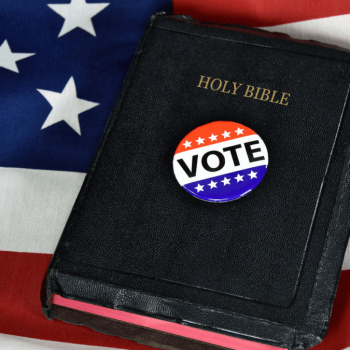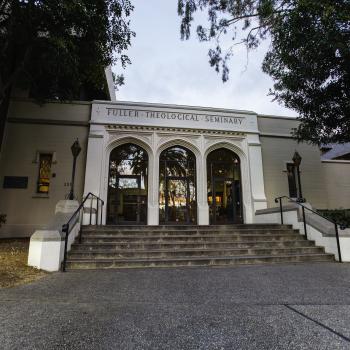+ As an institution, Fuller Seminary fully and unequivocally supports continued protection for the members of our society who are DACA recipients. Immigration legislation is a more complicated and long-term issue to solve, but for these young “Dreamers” we pledge our unwavering support. This article from President Mark Labberton shares more about our stance.
The following essay was written by Norma Ramirez, Jennifer Hernandez, Jean Carlos Arce Cabrera, and Lisseth Rojas-Flores. Dr. Rojas-Flores (pictured above at left), associate professor of marital and family therapy, researches trauma and the psychological impact of detention and deportation on the American citizen children of undocumented parents. Norma (pictured at right), a current PhD student in Fuller’s School of Psychology, and Jennifer, Fuller staff member, are DACA recipients.
Introduction
In Christ. A fundamental belief of those who adhere to the Christian faith is that our identity and security are found in the incarnate Word—in Christ Jesus. Most of us wrestle with this truth our whole lives as we are confronted by different idols that sell us empty promises. Now, on top of that personal existential struggle, imagine having to justify your humanity every single day. That is the reality of those of us who are living in liminal spaces due to a precarious legal status.
While our Bible tells us that in Christ Jesus we are children of God (Gal 3:26) and our future is secure, our present well-being is continuously under threat, resting on the validity of a single piece of paper. Our pain is exacerbated when the unity and comfort that are to be found among those who are in Christ—the Christian community—are denied to us by our brothers and sisters because we lack the appropriate paperwork. Apparently, there is no longer Jew or Greek, slave or free, male or female in Christ Jesus (Gal 3:28) unless you have proper documentation. Fighting every day for the right to belong, to be accepted by the people you love and the country you call home, takes its toll. Yet the church can find hope in Christ’s words and actions, which model the ways we are to resist and oppose the powers that seek to destroy God’s precious creation—and Christ’s resurrection gives us hope that one day justice and life will triumph over death.
What Is DACA? Since June 2012, when the Department of Homeland Security announced the implementation of a program called Deferred Action for Childhood Arrivals (DACA),1 many young, undocumented immigrants who came to the US as children received temporary relief from deportation and temporary work permits. To be eligible for DACA, applicants must meet stringent requirements, such as completing a high school degree, undergoing a biometric and medical exam, and demonstrating “good moral character” by avoiding felony convictions. Because of this temporary relief, thousands of young immigrants have been able to drive, work, and pursue higher education. But deferred action does not provide permanent legal status—and the protection from deportation it affords can be easily revoked, as demonstrated by the Trump administration’s decision to rescind DACA as of March 2018. Since the announcement to terminate DACA was made, over 17,000 young immigrants have lost their protected status, and many more are joining their ranks—with the precarious legal status of being undocumented—every day.2 In times such as these, it behooves us as people of faith to understand the multidimensional effects of DACA on the health of over 800,000 young members of our communities and to act in accordance with our biblical mandates.
. . . . . . . . . . . .
DACA and the Health of Young Adults
A growing body of research underscores some of the health challenges DACA recipients face. To guide our understanding of pathways in which DACA may influence the health of undocumented youth, we turn to the social determinants of health framework. Social determinants of health are defined as the “structural determinants and conditions in which people are born, grow, live, work, and age.”3 This public health framework demonstrates that precarious legal status, that is, growing up and living under the burden of uncertainty and illegality, impacts all aspects of one’s health. According to this framework, DACA potentially improves health and healing for its beneficiaries through four potential social determinants: economic stability, educational opportunities, social and community contexts, and access to health care. These determinants may promote or undermine the health and overall well-being of DACA young adults.
Physical Health: There is overwhelming evidence that DACA makes a positive difference in the overall physical health of “DACAmented” youth. DACA’s positive effects even extend across generations by increasing the health of both DACA-eligible mothers and their citizen children.4 Nonetheless, in hostile sociopolitical contexts, it is not surprising that even with DACA, recipients are twice as likely to delay medical care than are citizens, as DACA recipients are not covered by the Affordable Care Act. With the advent of the discontinuation of DACA, reports indicate that immigrant adults are being emotionally taxed by the threat of deportation, demonstrating higher levels of anxiety and psychological stress that are linked to cardiovascular risk factors and other health problems.
Mental Health: Physical health and mental health go hand in hand. Studies with DACA recipients have demonstrated improved mental health compared with non-recipients.5 In contrast, high levels of stress, nervousness, anxiety, overwhelming sadness, and shame are reported to be twice as high in DACA non-recipients than in DACA recipients.6 Among immigrants with an uncertain legal status, DACA non-recipients were four times more likely to be worried about being arrested or deported than their DACA peers. Notably, regardless of DACA status, the majority of respondents reported being worried about family members being arrested or deported.7 The majority of DACA recipients live within mixed-status families, where family members may have different immigration statuses ranging from citizen to undocumented. Those with precarious legal status are typically the parents and older family members who were too old to be qualify for DACA. Many DACAmented youth report feeling guilty that they hold a privileged legal status in relation to other family members and worry daily about the well-being of their loved ones, like Norma:
I am often reminded of the privilege I have in comparison to those who were not able to apply to DACA because an arbitrary date bars them protection from deportation. Many of my friends were not DACA-eligible because they were just slightly older than the cutoff age. I have a friend who has been a selfless advocate for immigration reform, yet her family has been separated due to immigration enforcement. Stories like these make me wonder if I am at the right place. When my peers go out to protest and I don’t join them because I have academic deadlines to meet, I feel like I am not doing enough. If my family and friends are not seen as “worthy” of legal status, I will never be able to experience the fullness of being a human being. How can we be okay if our parents are detained or deported?
Given these lived experiences, it should not come as a surprise that the psychological and emotional distress experienced by DACA holders exponentially increases with the uncertainty and anxiety created by the delay in Congress to pass legislation. The recent announcement of DACA termination clearly has adverse and chilling effects on their mental health, overall health, and spiritual well-being.
Academic Attainment and Educational Opportunities: Education is one of the best predictors of health, future economic vitality, and civic engagement. Growing up in the shadows often requires that one hide one’s academic aspirations and dampens the possibility of pursuing them. The number of apparently insurmountable barriers often renders many undocumented students hopeless about seeking support from teachers, counselors, and peers. Before DACA was introduced, there was very little financial support available for undocumented students. With the passing of the California Dream Act in 2011, several states, such as Colorado and Florida, have followed suit and provided in-state tuition and some financial assistance for DACA recipients. The positive impact of DACA on leveling the educational field for undocumented students has been recorded extensively. With protected status from deportation, DREAMers8 are finding it easier to attend school, pay tuition, and complete academic degrees at a higher rate than before. Yet many challenges remain and a tension is felt. Since there are still financial challenges due to inadequate financial support for DACA recipients to access and finish an undergraduate degree, they are taking longer to complete their degrees compared to their citizen peers. Consequently, the ability to pursue and complete an advanced degree, such as a master’s or a doctorate, decreases significantly for DACA recipients.
Economic Stability: Economic instability is one of the hallmarks of having a precarious legal status in the United States. Not being able to work sets in motion a host of short- and long-term challenges, including potential abuse by employers, housing and food insecurity, and lack of access to healthcare. Most DACA-eligible young adults are high-skill workers—in hospitality, retail, education, health and social services, and professional services—who were brought to the United States because their parents dreamed of a better future before they ever did. According to a study by the Migration Policy Institute published in November 2017, 55 percent of DACA recipients are gainfully employed, amounting to 382,000 workers. DACA-eligible youth are much less likely than non-DACA-eligible youth to work in construction jobs and are more likely to work in office support jobs, demonstrating that DACA can be a means to occupational mobility.9
Spiritual Health: Many DACA recipients who are Christians struggle with issues of faith and trust within their faith communities. Jennifer shares her experience:
As a DACA recipient, I am living somewhere between fear and courage; this tension is unsustainable for long periods of time. Some days my faith alone seems insufficient to sustain the pain produced by the political back-and-forth that directly impacts my future in this country. Moreover, it is painful to know that our houses of worship are filled with Christians who supported the current administration despite its harmful immigration rhetoric on the campaign trail. Many of us who are DACAmented Christians are conflicted. Some refrain from sharing their status with their church communities because their spiritual brothers and sisters, people they respect and love, have implicitly supported policies that have a detrimental impact on their lives.
For many DACAmented Christians, there is a deep fear of retaliation and rejection. Furthermore, the dichotomy of biblical interpretations makes it hard for DACA recipients to trust their faith communities, which leads to isolation and often a faith crisis. Many ask themselves: Are we reading the same Good News? Are we worshiping the same Jesus of Nazareth who came “to preach good news to the poor, to proclaim release to the prisoners and recovery of sight to the blind, to liberate the oppressed, and to proclaim the year of the Lord’s favor” (Luke 4:18–19)? We deeply grieve the Christian communities that support the current administration and its antagonizing political narratives against our immigrant communities. Now more than ever, the body of Christ must come together and enact justice for their immigrant sisters and brothers.
At the same time, we can find encouragement in the many evangelical communities that stand in solidarity with DACA recipients and advocate for a path to citizenship—such as CCDA (Christian Community Development Association), La Red de Pastores del Sur de California, Matthew 25, LA Voice, World Relief, and countless local churches that partner with these organizations. They advocate not only with their prayers but also with their actions for DACA recipients, DREAMers, and our families.
Significant social problems should be evaluated and tackled at multiple levels. The church cannot shy away from big social issues; it must be part of the solution. As we are all made in the image of God to grow, thrive, and heal in community, we are reminded of the healing and protective roles of the family and the community—most notably, our communities of faith. The broader community suffers negative consequences with the discontinuation of DACA. Beyond physical and psychological health, the community at large and future generations of children are also impacted. To put it simply, imagine your daughters, sons, cousins, and neighbors disappearing from one day to the next: that is the impact that the discontinuation of DACA will have on our community.
. . . . . . . . . . . .
DACA, the Church, and Holistic Healing
The body of Christ must play a central role in working for the holistic healing of DACA recipients and the undocumented, as Jennifer describes:
Some days, I feel the weight of being an “other” in the land that has been home for the last 19 years. Other days I feel empowered to own my story and share it with others, inviting them to stand in solidarity with me and the immigrant community. I want to have hope in the church and its members’ commitment to the Good News, which encompasses doing justice in ways that bring about holistic healing.
Our holy scriptures, as exemplified in Luke and Acts, teach us that the Spirit-filled, Spirit-led church is to continue Christ’s boundary-crossing ministry (Luke 4). In Christ, we are to build and participate in communities that are both physically and non-physically healing. A first step toward healing the wounds of those our society has “otherized” is, in the words of Father Greg Boyle, to leave behind the illusion that we are separate: “there is no us and them, just us.”10 Like the paralytic and his friends in Luke 5, we must be willing to bypass the crowds that seek to exclude and hoard Jesus’ healing power. We must be bold enough to work toward removing the obstacles—the “roofs”—that impede us from sitting at Christ’s feet. Healing those whom the religious and society exclude from communal participation has real implications. In Acts 4, Peter and John learned quickly that the consequence of carrying out Jesus’ healing and liberating ministry can be incarceration.
To assuage the myriad of devastating consequences that rescinding DACA would have on our DACAmented and undocumented sisters and brothers, their families, and all of our communities, the body of Christ must be willing to take bold action. We call on faith communities to do the following:
Pray for the Spirit to transform hardened hearts. We need our religious and political leaders to understand the ways in which our immigration laws are negatively impacting the health of thousands of people.
Share our resources in ways that support and protect those in liminal spaces due to the uncertainty of DACA.Supporting and sustaining the mental and physical health of the DACAmented and undocumented requires that we make monetary and non-monetary commitments to them. In Acts 2 and 4 we see how it is in the sharing of life—material and non-material—that we foster the sort of spiritual unity that is able to resist the forces that seek to prey on the weak.
Take action. We must reach out to our political leaders, imploring them to make programs and laws that will ensure the safety and well-being of our DACAmented and undocumented sisters and brothers. Find more resources below.
May the church today be as bold and courageous as the church in Acts who, by the power of the Spirit, resisted the authorities and assumed the consequences of doing God’s will on earth as it is in heaven. And may we—in Christ—find the unity that overcomes the powers that are working to divide the body of Christ. May God give justice quickly to the many DACAmented and undocumented individuals and their supporters who seek immigration reform at the steps of Congress. And may God find faithfulness in the church, a faithfulness that doesn’t waver but persists in seeking justice for our immigrant sisters and brothers.
















